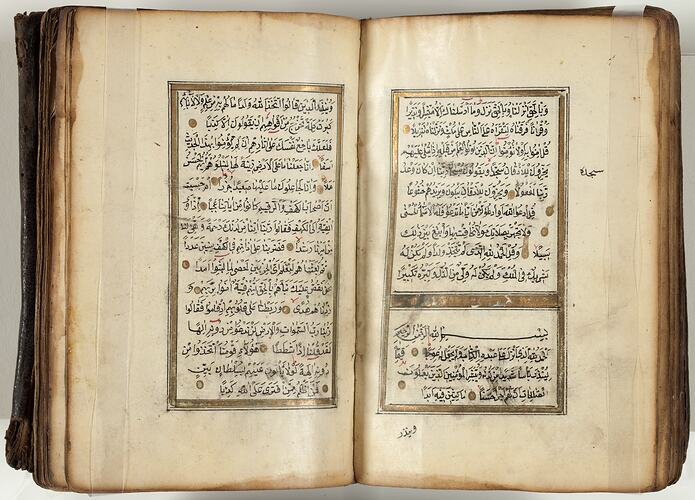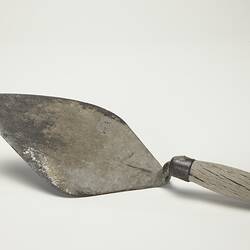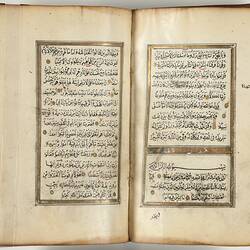The qur'an was used as an Imam teaching text at the Silvi Xhami (Cyprus mosque) theological school in Ohrid, Albania, now Macedonia. The qur'an is hand written, with the principal text in Arabic and the cover text in Turkish, and is around 300 years old. It would have taken about six years to transcribe by hand. The notes in red were made by teachers at the Silvi Xhami.
In the mid 1960s, Ohrid was struck by a major flood. When locals went to the mosque to help clean up the debris, they discovered a large number of qur'ans under the floorboards, where they had been hidden for fear of destruction during the communist regime. The Silvi Xhami was one of the last surviving mosques in Ohrid as the others had been demolished by the authorities. However before these prayer books were confiscated by the local authorities and probably destroyed, this one was secreted away and hidden by local resident Lufti Lloga. Lufti had become a 'muezzin' (one who calls the faithful to prayer) in his later years and recognised the cultural and religious value of this qur'an.
He brought the qu'oran to Australia in the early 1970s when he came to visit his son Erik who had migrated to Australia from Albania in 1969. When Erik was growing up his family had both Islamic and Catholic elements, although his immediate family were not practising, so he grew up around both mosques and churches. Erik had been unable to return to Albania to visit his family as he was avoiding imprisonment for not undertaking compulsory military training. Lufti was keen for Erik to 'save' the qur'an and the cultural traditions it represented, at a time when such traditions were under threat in many eastern bloc states.
In the late 1990s Erik donated the qur'an to the Shepparton Muslim Society in celebration of the opening of a community centre extension to the first Albanian mosque in Victoria. The Society stored the qur'an, although they never used it, before offering it to Museum Victoria.
The Ottoman empire occupied the lands now known as Albania from 1481 to 1912. In the early seventeenth century, large numbers of Albanians converted to Islam and by the eighteenth century the Albanian Muslim community was the largest religious group in Albania. The qur'an was probably created during this period. The Albanian lands united as an independent nation in 1912 after a series of bloody rebellions against their Ottoman rulers. Barely independent, Albania became embroiled in the Balkan wars and emerged in 1913 after the Treaty of Bucharest with borders excluding lands with large Albanian populations, such as Kosovo and western Macedonia where the town of Ohrid is located.
Italy invaded Albania in 1939 and began a process of Italianization, including the banning of the Albanian language. The Italian occupation ended when Nazi Germany invaded in 1943. The Albanian Communist party was formed in 1941 and was instrumental in defeating the Nazi German occupation forces in 1944. The Communist Party suppressed all religious observance and remained in power in various forms until 1992.
The town of Ohrid was listed as a World Heritage Site by UNESCO in 1980.
More Information
-
Keywords
-
Authors
-
Article types


